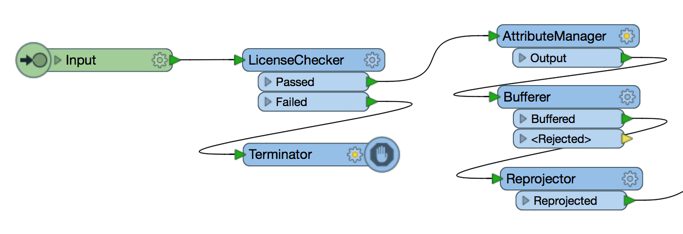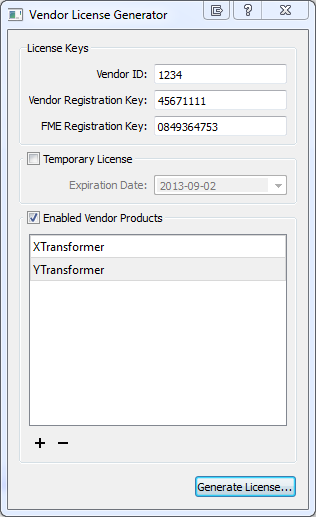LicenseChecker Scenario
This topic outlines the steps required to license a custom transformer or workspace (author/publisher), and download the custom transformer or workspace to use (end-user).
Author/Publisher Steps
Company ABC has created an FME custom transformer called XTransformer, which performs geometry manipulations. ABC wants to publish XTransformer to the FME Hub and protect this transformer by licensing.
Step 1: Create a Unique Registration Code
First, the author (company ABC) needs to create a unique Vendor Registration Key (for example, 45671111) that will be required as part of the validation process. This key does not have to be approved by or submitted to Safe Software.
Step 2: Validate Using the LicenseChecker
The author creates the XTransformer in FME Workbench and adds the LicenseChecker transformer to the data flow so that the translation succeeds only if the LicenseChecker transformer passes. Within the LicenseChecker, the author needs to specify the Vendor Registration Key created in step 1 and assign a unique Vendor ID (for example, 1234) specifically for this XTransformer product.

A license file name needs to be specified in the LicenseChecker. This file name will remain the same for all the licenses issued to the future end-users. To avoid possible conflict with other licenses, the license file name should be as unique as possible and include the publisher name. For example, xtransformer_com_abc.fmelic.

Step 3: Password Protect Transformer and Publish to FME Hub
The author saves the XTransformer with password protection. (Open the Navigator Pane and select Transformer Properties > Password). The author can then publish to FME Hub for public distribution, or choose to serve the XTransformer product through their own web portal.
Step 4: Licensing the Transformer for an End-User
If an FME user wants to download and use the XTransformer, the user will contact the author by sending an email with his or her FME registration key. Upon receiving the user’s key, the author will run the LicenseGenerator tool provided by Safe Software and generate a license file for the user. The license file should be named the same as the one specified in the LicenseChecker in Step 2.
A license file may support licensing single or multiple products. If the author has more than one product (for example, custom transformers or workspaces), these product names can be included in one license file and validated by separate LicenseChecker transformers.
For example, if the author has another custom transformer called YTransformer that does some attribute manipulations, company ABC can use the LicenseGenerator tool to add both XTransformer and YTransformer to the same license file:

End-User Steps
Step 1: User Downloads Transformer from FME Hub
An FME user sees the XTransformer published by company ABC in FME Hub and downloads it to their local computer.
Step 2: Create and Run Workspace
The user creates an FME workspace that includes the newly downloaded XTransformer.

When running this workspace, the FME translation fails and gives an error message that says something like XTransformer is not licensed. Please contact author@abc.com to obtain a license.

Step 3: Send License Request
The user will send a license request to the author, along with their FME registration key.
Step 4: License the Transformer
If the license request is granted by company ABC, the user will receive a license file xtransformer_com_abc.fmelic by email. The user needs to copy this license file to the licenses subfolder for their FME installations (for example, C:\ProgramData\FME\licenses).
Step 5: Run the Workspace with the Licensed Transformer
When the user runs the workspace with XTransformer again, the translation will succeed.